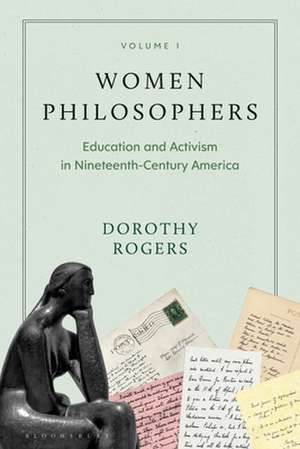Women Philosophers Volume I: Education and Activism in Nineteenth-Century America
Autor Dorothy G. Rogersen Limba Engleză Hardback – 5 feb 2020
Preț: 774.27 lei
Preț vechi: 1369.88 lei
-43% Nou
Puncte Express: 1161
Preț estimativ în valută:
148.15€ • 154.69$ • 122.62£
148.15€ • 154.69$ • 122.62£
Carte tipărită la comandă
Livrare economică 04-18 aprilie
Preluare comenzi: 021 569.72.76
Specificații
ISBN-13: 9781350070592
ISBN-10: 1350070599
Pagini: 264
Ilustrații: 12 b&w
Dimensiuni: 156 x 234 mm
Greutate: 0.77 kg
Editura: Bloomsbury Publishing
Colecția Bloomsbury Academic
Locul publicării:London, United Kingdom
ISBN-10: 1350070599
Pagini: 264
Ilustrații: 12 b&w
Dimensiuni: 156 x 234 mm
Greutate: 0.77 kg
Editura: Bloomsbury Publishing
Colecția Bloomsbury Academic
Locul publicării:London, United Kingdom
Caracteristici
Illuminates a significant time in women's and feminist philosophical history, challenging the canon of 'great male philosophers'
Notă biografică
Dorothy Rogers is Associate Professor of Philosophy and Religion, Montclair State University, USA. She is a member of MSU's Women's & Gender Studies Advisory Board and MSU's President's Commission on Affirmative Action. She also participates in the GLBTQ support program, Safe Space.
Cuprins
Preface and acknowledgementsAbout the cover 1. Introduction: Women, Diversity, and Philosophy in North America 2. Pedagogy, Philosophy, and "Spiritual Motherhood": Susan Blow, Mary Church Terrell, Josephine Yates, Emma Johnson Goulette 3. Feminist Philosophers/Educators: Anna Brackett, Grace Bibb, Fanny Jackson Coppin, Ana Roqué 4. Audacious Women! - Four Independent Scholars: Margaret Mercer, Maria Stewart, Pauline Johnson, Ellen Mitchell 5. Feminist Activists/Theorists: Lucia Ames Mead, Jane Addams, Ida B. Wells-Barnett, Luisa CapetilloNotesReferences Index
Recenzii
This text illuminates the truth that "the 'mainstream' of intellectual thought is only one of the streams". It broadens and deepens the philosophical canon of North America by introducing women and diversity hitherto neglected and importantly provides the possibility for the current canon to become more comprehensive and more accurate as a reflection of the philosophical thinking in the early American Idealist movement.
Rogers' book is, among other things, a provocative and compelling attempt to answer the question 'Who can be called a philosopher?' Through the lives of these women she charts a close connection between genre and opportunity, specialism and exclusion. In doing so she challenges those of use who seek to 'diversify the cannon' to reflect more deeply on what philosophy is and can be, and what the life of a practicing philosopher might look like.
Rogers' book is, among other things, a provocative and compelling attempt to answer the question 'Who can be called a philosopher?' Through the lives of these women she charts a close connection between genre and opportunity, specialism and exclusion. In doing so she challenges those of use who seek to 'diversify the cannon' to reflect more deeply on what philosophy is and can be, and what the life of a practicing philosopher might look like.
